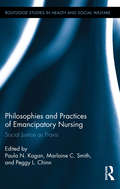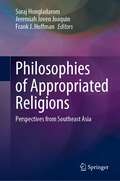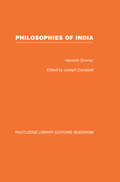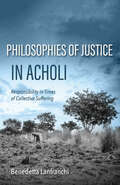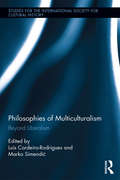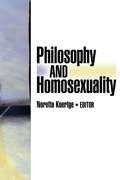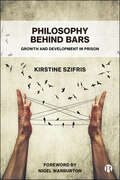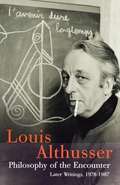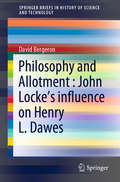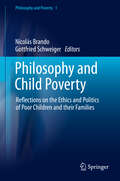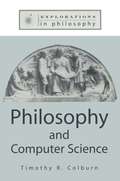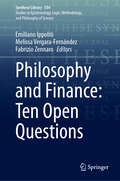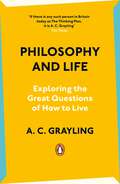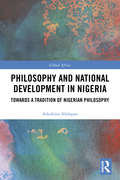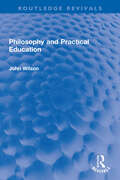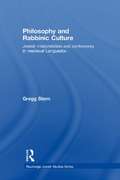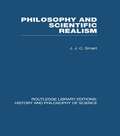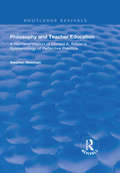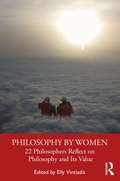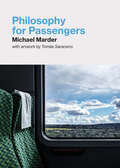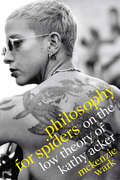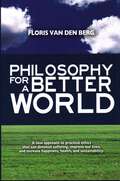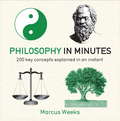- Table View
- List View
Philosophies and Practices of Emancipatory Nursing: Social Justice as Praxis (Routledge Studies in Health and Social Welfare #11)
by Paula N. Kagan Marlaine C. Smith Peggy L. Chinn*** Awarded First Place in the 2015 AJN Book of the Year Award in two categories - "History and Public Policy" and "Professional Issues" *** This anthology presents the philosophical and practice perspectives of nurse scholars whose works center on promoting nursing research, practice, and education within frameworks of social justice and critical theories. Social justice nursing is defined by the editors as nursing practice that is emancipatory and rests on the principle of praxis which is practice aimed at attaining social justice goals and outcomes that improve health experiences and conditions of individuals, their communities, and society. There is a lack in the nursing discipline of resources that contain praxis approaches and there is a need for new concepts, models, and theories that could encompass scholarship and practice aimed at purposive reformation of nursing, other health professions, and health care systems. Chapters bridge critical theoretical frameworks and nursing science in ways that are understandable and useful for practicing nurses and other health professionals in clinical settings, in academia, and in research. In this book, nurses’ ideas and knowledge development efforts are not limited to problems and solutions emerging from the dominant discourse or traditions. The authors offer innovative ways to work towards establishing alternative forms of knowledge, capable of capturing both the roots and complexity of contemporary problems as distributed across a diversity of people and communities. It fills a significant gap in the literature and makes an exceptional contribution as a collection of new writings from some of the foremost nursing scholars whose works are informed by critical frameworks.
Philosophies of Appropriated Religions: Perspectives from Southeast Asia
by Soraj Hongladarom Jeremiah Joven Joaquin Frank J. HoffmanThis book brings together different intercultural philosophical points of view discussing the philosophical impact of what we call the ‘appropriated’ religions of Southeast Asia. Southeast Asia is home to most of the world religions. Buddhism is predominantly practiced in Thailand, Vietnam, Myanmar, Singapore, Laos, and Cambodia; Islam in Malaysia, Indonesia, and Brunei; and Christianity in the Philippines and Timor-Leste. Historical data show, however, that these world religions are imported cultural products, and have been reimagined, assimilated, and appropriated by the culture that embraced them. In this collection, we see that these ‘appropriated’ religions imply a culturally nuanced worldview, which, in turn, impacts how the traditional problems in the philosophy of religion are framed and answered—in particular, questions about the existence and nature of the divine, the problem of evil, and the nature of life after death. Themes explored include: religious belief and digital transition, Theravāda Buddhist philosophy, religious diversity, Buddhism and omniscience, indigenous belief systems, divine apology and unmerited human suffering, dialetheism and the problem of evil, Buddhist philosophy and Spinoza’s views on death and immortality, belief and everyday realities in the Philippines, comparative religious philosophy, gendering the Hindu concept of dharma, Christian devotion and salvation during the Spanish colonial period in the Philippines through the writings of Jose Rizal, indigenous Islamic practices in the Philippines, practiced traditions in contemporary Filipino celebrations of Christmas, role of place-aspects in the appropriation of religions in Southeast Asia, and fate and divine omniscience. This book is of interest to scholars and researchers of philosophy of religion, sociology of religion, anthropology of religion, cultural studies, comparative religion, religious studies, and Asian studies.
Philosophies of India (Routledge Library Editions: Buddhism #9)
by Heinrich ZimmerOriginally published in 1973. The volume is divided into four sections: The introduction places the position of the Buddhist Tantras within Mahayana Buddhism and recalls their early literary history, especially the Guhyasamahatantra; the section also covers Buddhist Genesis and the Tantric tradition. The foundations of the Buddhist Tantras are discussed and the Tantric presentation of divinity; the preparation of disciples and the meaning of initiation; symbolism of the mandala-palace Tantric ritual and the twilight language. This section explores the Tantric teachings of the inner Zodiac and the fivefold ritual symbolism of passion. The bibliographical research contains an analysis of the Tantric section of the Kanjur exegesis and a selected Western Bibliography of the Buddhist Tantras with comments.
Philosophies of Justice in Acholi: Responsibility in Times of Collective Suffering (World Philosophies)
by Benedetta LanfranchiSince 2008 Ugandans residing in the northern region of Acholiland have been faced with the uncertainties of justice stemming from the twenty-year civil war waged between the Ugandan government and Joseph Kony's Lord's Resistance Army (LRA). Seeking accountability and reconciliation within their communities, Acholi and non-Acholi have had to grapple with large-scale practical and philosophical questions: Whose legal system should deliver justice for victims, and what are the aims and responsibilities of justice as a concept?Philosophies of Justice in Acholi focuses on Acholi traditional mechanisms of justice (ATJMs), which became the central framework for jurisprudence outlined in the peace agreements that were brokered from 2006 to 2008. Framing community members' responsibilities in terms of their ancestral beings has facilitated a justice process that understands the inseparable relations between individuals and groups and thus provides pathways to reclaim social, moral, and material lives. While ATJMs have thus far fallen short of addressing national and global polities' responsibilities in the conflict, their core premises hold promise for defining Uganda's still-developing political justice process and for humans everywhere seeking justice.Delving into understandings of fairness, responsibility, and group identity, Philosophies of Justice in Acholi reveals that justice, and its effect on collective existence, is always political.
Philosophies of Multiculturalism: Beyond Liberalism (Studies for the International Society for Cultural History #9)
by Luís Cordeiro-Rodrigues Marko SimendićThis edited collection offers a comparative approach to the topic of multiculturalism, including different authors with contrasting arguments from different philosophical traditions and ideologies. It puts together perspectives that have been largely neglected as valid normative ways to address the political and moral questions that arise from the coexistence of different cultures in the same geographical space. The essays in this volume cover both historical perspectives, taking in the work of Hobbes, Tocqueville and Nietzsche among others, and contemporary Eastern and Western approaches, including Marxism, anarchism, Islam, Daoism, Indian and African philosophies.
Philosophische Spaziergänge: Vorsichtige Antworten auf die Frage, wie man sich denn im Leben einzurichten hätte
by Ludwig GieszLudwig Giesz (1916–1985) verbindet einen ausgeprägten philosophischen Spürsinn für das Hinter- und Abgründige der menschlichen Existenz mit einer selten gewordenen stilistischen Brillanz. Die dritte Auflage der „Philosophischen Spaziergänge“ bietet eine erweiterte und in jeder Hinsicht außergewöhnliche Sammlung von Essays und Radiovorträgen über Autoren und Themen aus der Welt der Philosophie. Giesz präsentiert kongeniale und ebenso heitere wie pikante Darstellungen von Autoren und Themen philosophischer Literatur aus Geschichte und Gegenwart. Ähnlich wie Friedrich Nietzsche verrät sein Stil die Bevorzugung der kleinen Form, und ähnlich wie Sören Kierkegaard ist er eine Ausnahme unter den Vertretern seiner Zunft. Das Buch ist sowohl für Kennerinnen als auch für Liebhaber geeignet, die neugierig sind auf Philosophie mit Esprit.
Philosophy And Homosexuality
by Noretta KoertgeFor a balanced discussion of the main social, medical, and philosophical aspects of homosexuality, here is the ideal book. Written by philosophers of science, each comprehensive chapter takes a critical look at research on the etiology of homosexuality. Read Philosophy and Homosexuality and examine the evidence for both the sociobiological and hormonal explanations of homosexuality and study the definitions of sexual orientation and how they have affected research.
Philosophy Behind Bars: Growth and Development in Prison
by Kirstine SzifrisLong-term prisoners need to be given the space to reflect, and grow. This ground-breaking study found that engaging prisoners in philosophy education enabled them to think about some of the ‘big’ questions in life and as a result to see themselves and others differently. Using the prisoners’ own words, Szifris shows the importance of this type of education for growth and development. She demonstrates how the philosophical dialogue led to a form of community which provided a space for self-reflection, pro-social interaction and communal exploration of ideas, which could have long-term positive consequences.
Philosophy Of The Encounter: Later Writings, 1978-1987
by Louis Althusser G. M. Goshgarian Francois Matheron Oliver CorpetIn the late 1970s and 1980s, Louis Althusser endured a period of intense mental instability during which he murdered his wife and was committed to a psychiatric hospital. Spanning this deeply troubling period, this fourth and final volume of political and philosophical writings reveals Althusser wrestling in a creative and unorthodox fashion with a whole series of theoretical problems to produce some of his very finest work. In his profound exploration of questions of determinism and contingency, Althusser developed a "philosophy of the encounter," which he links to a hidden and subterranean tradition in the history of Western thought which stretches from Epicurus through Spinoza and Machiavelli to Marx, Derrida and Heidegger.
Philosophy and Allotment : John Locke's influence on Henry L. Dawes (SpringerBriefs in History of Science and Technology)
by David BergeronThis book provides a new perspective for examining the Native policies of the late nineteenth century. It centers on the figure of Henry Laurens Dawes, and more specifically, on the conceptual roots of his views on allotment, education and assimilation. These roots are grounded in John Locke’s epistemology and pedagogy. Through a philosophical analysis of Dawes’ ideas and policies, the book provides a new approach to arrive at a better understanding of an important historical process. In this regard, an often-overlooked link between philosophy and history is clarified, helping philosophers, historians and other scholars in their quest for knowledge. This book clarifies the impact of philosophical ideas on historical conceptions, and by studying Dawes, also addresses the reflection behind a major historical process. Political and social philosophers, as well as historians of ideas and of Native policies, will greatly benefit from this concise book.
Philosophy and Child Poverty: Reflections on the Ethics and Politics of Poor Children and their Families (Philosophy and Poverty #1)
by Gottfried Schweiger Nicolás BrandoThis book offers a broad and diverse reflection of the ways in which child poverty could be conceptualised, and the ways in which it is intertwined with childhood as a specific social condition. Furthermore, the responsibilities towards children and the possible mechanisms required for dealing with this condition will be analysed and clarified. This is the first volume on philosophy and child poverty. Despite the increasing number of publications on poverty, the particular phenomenon of poverty during childhood has not received much philosophical attention. This is surprising, given the severity and depth of child poverty around the globe. This volume brings together various philosophical approaches and how they understand and tackle child poverty. This is an important addition to the philosophical literature, which is also of wider interest to scholars working in the social sciences and with an interest in child poverty.
Philosophy and Computer Science
by Timothy ColburnColburn (computer science, U. of Minnesota-Duluth) has a doctorate in philosophy and an advanced degree in computer science; he's worked as a philosophy professor, a computer programmer, and a research scientist in artificial intelligence. Here he discusses the philosophical foundations of artificial intelligence; the new encounter of science and philosophy (logic, models of the mind and of reasoning, epistemology); and the philosophy of computer science (touching on math, abstraction, software, and ontology).
Philosophy and Finance: Ten Open Questions (Synthese Library #504)
by Emiliano Ippoliti Melissa Vergara-Fernández Fabrizio ZennaroThis volume presents ten thought-provoking essays exploring issues in the philosophy of finance that are crucial for the economy and society. They also show the mutual relations and benefits between finance and philosophy. These issues include the link between financial systems and climate change, the ontologies of finance that are essential for market design, the role and effect of AI in the financial systems, the nature and prospects of money and their digital version, methodological problems in the use of models and mathematics in the financial world, and critical discussions of some of the main theories on financial systems, like the efficient market hypothesis. As this volume covers a wide array of topics whilst still forming a coherent whole, it is of interest to philosophers of finance, philosophers of science, epistemologists, and philosophers of economics, as well as to scientists and practitioners interested in the debates over methodological, ontological, epistemological as well as ethical issues in finance.
Philosophy and Life: Exploring the Great Questions of How to Live
by A. C. Grayling'Grayling brings satisfying order to daunting subjects' Steven Pinker'An enthusiastic thinker who embraces humour, common sense and lucidity' Independent_______________From the eminent philosopher, an authoritative exploration of the great questions of how to live'There is a question everyone has to ask and answer - in fact, has to keep on asking and keep on answering. It is, 'How should I live my life?' meaning, 'What values shall I live by? 'What sort of person should I be? What shall I aim for?' The great majority of people do not ask this question, they merely answer it unthinkingly, by adopting conventional views of life and what matters in it...'From Stoics to existentialists, in philosophy and literature, discussion of the philosophy of life -- of love and death, of courage, fortitude and wisdom -- challenges us all to think about what kinds of life are truly worth living. In this summation of a lifetime thinking and writing about this great question, A. C. Grayling explores with clarity and depth the ideas that each of us must use in answering it for ourselves.Drawing on the lives, experiences and works of a fantastically eclectic range of thinkers -- taking in not only philosophers such as Confucius, Seneca and Nietzsche, but also authors from Shakespeare to Ursula LeGuin, and modern thinkers such as Martha Nussbaum and Bernard Williams - Philosophy and Life brings together wisdom from across eras and continents in a tour de force on the philosophy of being human in a complicated world.
Philosophy and National Development in Nigeria: Towards a Tradition of Nigerian Philosophy (Global Africa)
by Adeshina AfolayanWhat does it imply for Nigerian philosophers to conscientiously and engagingly reflect on Nigeria as a place of philosophy and as a dynamic plural context of socioeconomic, political, cultural and ethnic problems? Any answer to this question automatically constitutes the opening salvo to the reflection on the evolution of a Nigerian tradition of philosophy and philosophizing. This book represents such an initial salvo in in its attempt to hammer out the conditions for the possibility of a Nigerian tradition of philosophy by placing that endeavor in between the triadic challenges of the Nigerian political economy, the African philosophical theorizing and the global epistemological hegemony. How do these three dynamics condition the evolution and functional relevance of the philosophical enterprise in Nigeria? How have Nigerian philosophers responded to them? What is Nigerian philosophy? How can there be a "Nigerian" philosophy when there are no Nigerians? This book is also an attempt to contribute to the trajectory of philosophy education in Nigeria within the context of a postcolonial educational system and university dynamics that stultifies the role of the intellectuals in development. From Plato to Wiredu, from Bodunrin to Bourdieu, and from Heidegger and Nietzsche to Fanon, Mignolo and Santos, the book traces a trajectory of dynamics rethinking of existing paradigms and epistemological assumptions that could enable a robust evolution of a Nigerian tradition of philosophy that possesses sufficient clout to confront its historicity and its place in Nigeria’s development impasse.
Philosophy and Practical Education (Routledge Revivals)
by John WilsonFirst published in 1977, Philosophy and Practical Education attempts to relate philosophy with education. It deals with themes like school, discipline, authority, curriculum, subjects, autonomy etc. to 1) discuss topics which are necessarily of direct practical concern to teachers and educators; 2) to showcase that an increase in our conceptual clarity suggests, fairly unambiguously, certain kinds of practical action; and as 3) they have not been properly dealt with in existing philosophical literature. This book is an essential read for educators, teachers, and curriculum developers.
Philosophy and Rabbinic Culture: Jewish Interpretation and Controversy in Medieval Languedoc (Routledge Jewish Studies Series)
by Gregg SternPhilosophy and Rabbinic Culture is a study of the great, and curiously underappreciated, engagement of a Medieval European Jewish community with the philosophic tradition. This lucid description of the Languedocian Jewish community's multigenerational cultivation of - and acculturation to - scientific and philosophic teachings into Judaism fulfils a major desideratum in Jewish cultural history. In the first detailed account of this long-forgotten Jewish community and its cultural ideal, the author gives an expansive reappraisal of the role of the philosophic interpretation in rabbinic culture and medieval Judaism. Looking at how the cultural ideal of Languedocian Jewry continued to develop and flourish throughout the thirteenth and fourteenth centuries, with particular reference to the literary style and religious teaching of the great Talmudist, Menahem ha-Meiri, Stern explores issues such as Meiri’s theory of "civilized religions", including Christianity and Islam, controversy over philosophy and philosophic allegory in Languedoc and Catalonia, and the cultural significance of the medical use of astrological images. This book will be of great interest to scholars and students of Religion, of Judaism in particular, and of Philosophy, History and Medieval Europe, as well as those interested in Jewish-Christian relations.
Philosophy and Scientific Realism (Routledge Library Editions: History & Philosophy of Science)
by J J SmartOriginally published in 1963. In an introductory chapter the author argues that philosophy ought to be more than the art of clarifying thought and that it should concern itself with outlining a scientifically plausible world view. Early chapters deal with phenomenalism and the reality of theoretical entities, and with the relation between the physical and biological sciences. Free will, issues of time and space and man’s place in nature are covered in later chapters.
Philosophy and Teacher Education: A Reinterpretation of Donald A.Schon's Epistemology of Reflective Practice (Routledge Revivals)
by Stephen NewmanPublished in 1999, this text sets out to give a reinterpretation of Schon's work. It breaks new ground by looking systematically at the entirety of his writings, by identifying critical difficulties with Schon's work, and by subjecting his work to reinterpretation.
Philosophy by Women: 22 Philosophers Reflect on Philosophy and Its Value
by Elly VintiadisWhat is philosophy, why does it matter, and how would it be different if women wrote more of it? At a time when the importance of philosophy, and the humanities in general, is being questioned and at a time when the question of gender equality is a huge public question, 22 women in philosophy lay out in this book how they think of philosophy, what they actually do, and how that is applied to actual problems. By bringing together accounts of the personal experiences of women in philosophy, this book provides a new understanding of the ways in which the place of women in philosophy has changed in recent decades while also introducing the reader to the nature and the value of philosophy.
Philosophy for Passengers
by Michael MarderA philosophical guide to passengerhood, with reflections on time, space, existence, boredom, our sense of self, and our sense of the senses.While there are entire bookstore sections—and even entire bookstores—devoted to travel, there have been few books on the universal experience of being a passenger. With this book, philosopher Michael Marder fills the gap, offering a philosophical guide to passengerhood. He takes readers from ticketing and preboarding (preface and introduction) through a series of stops and detours (reflections on topics including time, space, existence, boredom, our sense of self, and our sense of the senses) to destination and disembarking (conclusion). Marder finds that the experience of passengers in the twenty-first century is experience itself, stretching well beyond railroad tracks and airplane flight patterns. On his journey through passengerhood, he considers, among many other things, passenger togetherness, which goes hand in hand with passenger loneliness; flyover country and the idea of placeness; and Descartes in an airplane seat. He tells us that the word metaphor means transport in Greek and discusses the gray area between literalness and metaphoricity; explains the connection between reading and riding; and ponders the difference between destination and destiny. Finally, a Beckettian disembarking: you might not be able to disembark, yet you must disembark. After the voyage in the world ends, the journey of understanding begins.
Philosophy for Spiders: On the Low Theory of Kathy Acker
by McKenzie WarkIt's time to recognize Kathy Acker as one of the great postwar American writers. Over the decades readers have found a punk Acker, a feminist Acker, a queer Acker, a kink Acker, and an avant-garde Acker. In Philosophy for Spiders, McKenzie Wark adds a trans Acker. Wark recounts her memories of Acker (with whom she had a passionate affair) and gives a comprehensive reading of her published and archived works. Wark finds not just an inventive writer of fiction who pressed against the boundaries of gender but a theorist whose comprehensive philosophy of life brings a conceptual intelligence to the everyday life of those usually excluded from philosophy's purview. As Wark shows, Acker's engagement with topics such as masturbation, sadism, body-building, and penetrative sex are central to her distinct phenomenology of the body that theorizes the body's relation to others, the city, and technology.
Philosophy for a Better World
by Floris Van Den BergYou won't see the world in the same light after reading this urgent and inspiring call to action. In this thought-provoking book, Dutch philosopher Floris van den Berg proposes a new perspective, called universal subjectivism, which can be adopted by anyone regardless of religious or philosophical orientation. It takes into consideration the universal capacity for suffering and, through raising awareness, seeks to diminish that suffering and increase happiness. With consistent and compelling moral reasoning, van den Berg shows that the world can be organized to ensure more pleasure, beauty, justice, happiness, health, freedom, animal welfare, and sustainability. The author emphasizes that today the near-term future is our greatest challenge: our affluent western lifestyle will soon exceed the limits of the earth's sustainable capacity and must soon change drastically to ward off a worldwide environmental collapse. Knowing this, we should all reevaluate the daily routines we take for granted: taking the car to work, boarding a plane to a business or vacation destination, eating meat, or using plastic bags in stores. There are ethical and ecological objections to each of these examples. In fact, if we applied a strict ethical analysis to our lifestyle, almost nothing we do would pass muster. A lot of avoidable suffering attaches to our way of life. After reading this book, the world won't look the same. Concluding with an eco-humanist manifesto, this book not only offers much food for thought but, more importantly, an urgent and inspiring call to action.
Philosophy in Minutes
by Marcus WeeksPhilosophy in Minutes distils 200 of the most important philosophical ideas into easily digestible, bite-sized sections. The core information for every topic - including debates such as the role of philosophy in science and religion, key thinkers from Aristotle to Marx, and introductions to morality and ethics - is explained in straightforward language, using illustrations to make the concepts easy to understand and remember. Whether you are perplexed by existentialism or pondering the notion of free will, this accessible small-format book will help any reader to quickly grasp the basics of this highly nuanced subject. Chapters include: Truth and logic, Marxism, Communism and Socialism, Ontology, Philosophy and literature, Existence of God, Feminist theory, Consciousness, The future of philosophy.
Philosophy in Minutes (IN MINUTES)
by Marcus WeeksPhilosophy in Minutes distils 200 of the most important philosophical ideas into easily digestible, bite-sized sections. The core information for every topic - including debates such as the role of philosophy in science and religion, key thinkers from Aristotle to Marx, and introductions to morality and ethics - is explained in straightforward language, using illustrations to make the concepts easy to understand and remember. Whether you are perplexed by existentialism or pondering the notion of free will, this accessible small-format book will help any reader to quickly grasp the basics of this highly nuanced subject. Chapters include: Truth and logic, Marxism, Communism and Socialism, Ontology, Philosophy and literature, Existence of God, Feminist theory, Consciousness, The future of philosophy.
